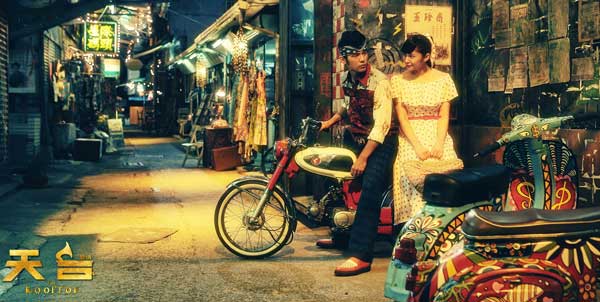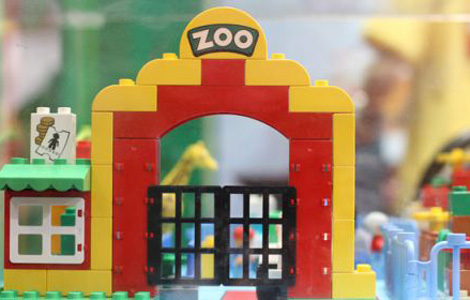Complete showman
Updated: 2013-07-30 23:56
(China Daily)
|
||||||||
By his latest film The Rooftop, Jay Chou proves he could be not only a music prodigy, but also a successful film director. Photo provided to China Daily

The movies he merely stars in may not be the best of the bunch, but those he makes with full creative control never fail to turn heads. Music sensation Jay Chou morphs from a wonder boy with a Midas touch into a mature artist with more strengths than weaknesses, writes Raymond Zhou.
Few entertainers or artists get to dominate a whole decade. For those that do, Act Two of their career is decidedly mixed.
Jay Chou has been a marginal player in Chinese-language cinema. Even though his 2007 debut in feature-film directing was a smash success, he was still seen as riding on the coattails of his all-engulfing music accomplishments as Secret is built around extended passages of music.
The Rooftop, his follow-up that opened on July 11, is not meant to shake off his image as a music prodigy. Rather, it was conceived as a musical, with Chou composing more than two dozen tunes for it. But it is not a conventional musical. Even the pair of lovebirds do not get to warble a big duet. "I use the song-and-dance numbers as a kind of music accompaniment," reveals Chou in an exclusive interview with China Daily.
"Ideally, a musical director should be able to translate the imagery in his head into music. But most would hire professional musicians for that. I happen to be trained in music and have an interest in movie directing, so the creation process is more direct for me and the two skills complement each other."
Not only did Chou compose all the original music, but he also conceived the staging for many of the tunes. It is not surprising since Chou directed most of his own music videos and many of his songs portray exotic or historical scenes in movie-like vicissitudes. Some of the numbers in The Rooftop turn out to have a Broadway quality, this for someone whose exposure to the genre is limited to Moulin Rouge, Mama Mia! and a few others. "I'm more into action movies, riding motorcycles, etcetera," he says. The result is only the love story gets the musical treatment while the gangster part is conspicuously devoid of singing or dancing. "I cannot imagine villains singing their lines. It would be weird, wouldn't it?"
Chou follows the philosophy that there should not be singing and dancing for the sake of singing and dancing. His proudest number is a love ballad set against the screen of a shadow-puppet show. "I was sure others had used it before, but I wanted to use it to tell a story. There's no special effect here. All the animals and flowers and transformation were done with our hands and our bodies."
The story for The Rooftop was set in the 1970s partly for the purpose of bridging a generation gap. Chou, never shy about admitting his closeness to his mother, a single parent who brought him up, wants his mother's generation to love this movie as much as he wants the younger generation to embrace it. It also gave him an opportunity to create a highly stylized world in which the rooftop represents a poor man's paradise. Although he, or rather the male lead he plays, ends up getting the girl, he designs a rival who is not only much more wealthy but possesses better looks. That person turns out to be the lesser of two villains but the immediate rival for his love interest. In Secret, this role is a competitor in a piano playoff.
Chou says he identifies with the social underdog because he himself used to be a struggling artist, having to sleep in the recording studio when riding his motorbike home was too exhausting. "Even now, I don't have many friends from wealthy backgrounds," he says, explaining that his passion for vintage cars is more a matter of personal taste than one of money.
Artistically, Chou has been praised for his taste. His music background has given him not just the ear but the eye for fluid storytelling. Although the story, which he wrote, is not strong or original and the different genre elements fail to merge seamlessly, his directing is assured with many strokes of genius.
"Everyone who wants to be a director has a desire to act, but he may not be a good actor. I know what I want from an actor and have a way of getting the result, but left on my own I may not be able to act it out," he says. Coincidentally, the China Film Directors Association echoed his self-appraisal in a rare candid post on its micro blog account: "He may not be a good actor; but he is absolutely a good film director!"
That means, we may expect greater things from the boy next door who can play a dozen musical instruments and ooze cool mumbling words unintelligible to most people. In a way, The Rooftop feels like a midway stop as he explores the uncharted waters of narrative art. It is a unique challenge in genre choice because the musical is extremely difficult to pull off and, without creating much of a hoopla, it has climbed over the 100-million-yuan ($16 million) mark in box-office returns in the Chinese mainland, a first for a musical film. This in a country where Les Miserables, for all its fantastic word-of-mouth, grossed no more than half that amount.
"I'm glad that people mention Les Mis in the same sentence as The Rooftop. I hope my work can be a new signpost when people talk about Chinese-language musicals," Chou says. "But I have bigger ambitions."
 |
|
Chou plays the lead actor in the film. Photo provided to China Daily |

 'Despicable' minions upset Depp's 'Lone Ranger' at box office
'Despicable' minions upset Depp's 'Lone Ranger' at box office
 'Taken 2' grabs movie box office crown
'Taken 2' grabs movie box office crown
 Rihanna's 'Diamonds' tops UK pop chart
Rihanna's 'Diamonds' tops UK pop chart
 Fans get look at vintage Rolling Stones
Fans get look at vintage Rolling Stones
 Celebrities attend Power of Women event
Celebrities attend Power of Women event
 Ang Lee breaks 'every rule' to make unlikely new Life of Pi film
Ang Lee breaks 'every rule' to make unlikely new Life of Pi film
 Rihanna almost thrown out of nightclub
Rihanna almost thrown out of nightclub
 'Dark Knight' wins weekend box office
'Dark Knight' wins weekend box office
Most Viewed
Editor's Picks

|

|

|

|

|

|
Today's Top News
Poison dumpling suspect faces 10 years in jail
Families of crash victims to sue Asiana in the US
China, US will discuss human rights
Former US president plans to visit DPRK
China struggles to retain talents
Apple in labor rights inquiry
SOEs overseas profits to soar
Detroit: Gold mine for China
US Weekly

|

|







